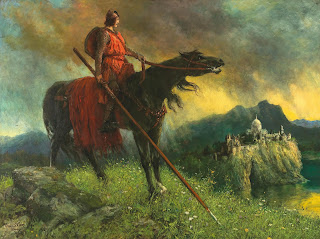13th of January 1882
Richard Wagner completes his final opera "Parsifal"
Parsifal is an opera in three acts composed by Richard Wagner with a libretto by the composer himself. It premiered on July 26, 1882, at the Bayreuth Festspielhaus, the theater Wagner designed specifically for his works. The opera is Wagner’s final completed composition and is often considered one of his most profound and spiritual works.
Story Overview:
The opera is based on medieval legends of the Holy Grail and the Arthurian knight Parsifal (Percival). It explores themes of redemption, compassion, and spiritual enlightenment.
Act 1:
• In the forest near the Grail Castle, the knights of the Holy Grail suffer due to their king Amfortas’s wound, inflicted by his failure to resist the temptress Kundry.
• Parsifal, a young and naive knight, appears, ignorant of his origins and destiny.
• He is brought to the Grail Castle, where the sacred relics are kept, but fails to understand their significance.
Act 2:
• At the castle of Klingsor, a magician who opposes the Grail knights, Kundry attempts to seduce Parsifal.
• Parsifal resists her, realizing the suffering caused by desire and sin.
• He defeats Klingsor and takes the sacred spear, which can heal Amfortas.
Act 3:
• Years later, Parsifal returns to the Grail Castle, now in despair due to Amfortas’s worsening condition.
• Parsifal uses the spear to heal Amfortas and becomes the new guardian of the Holy Grail.
• The opera concludes with a vision of spiritual redemption.
Musical Significance:
“Parsifal” is noted for its profound and meditative music, with themes such as the “Dresden Amen” and the Grail leitmotif woven throughout. Wagner referred to it as a “stage-consecrating festival play” (Bühnenweihfestspiel), reflecting its unique status in his oeuvre.
Legacy:
The work has inspired intense devotion and controversy due to its religious and philosophical content. Its performances were restricted to Bayreuth for many years, honoring Wagner’s wishes.





No comments:
Post a Comment